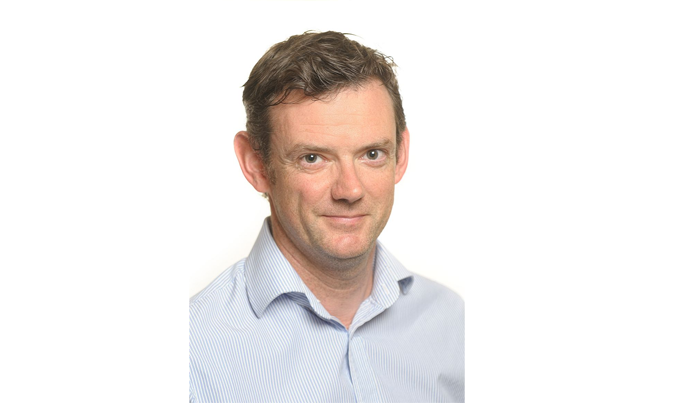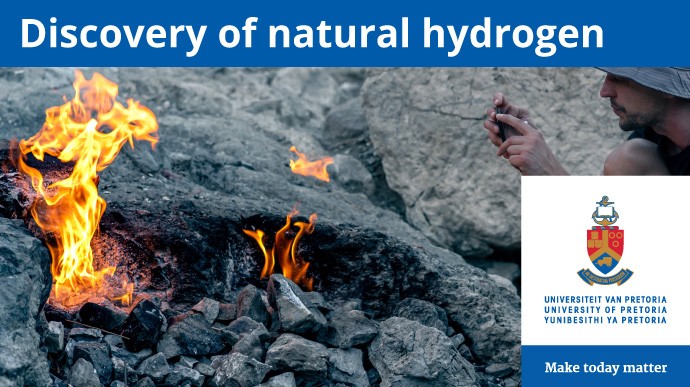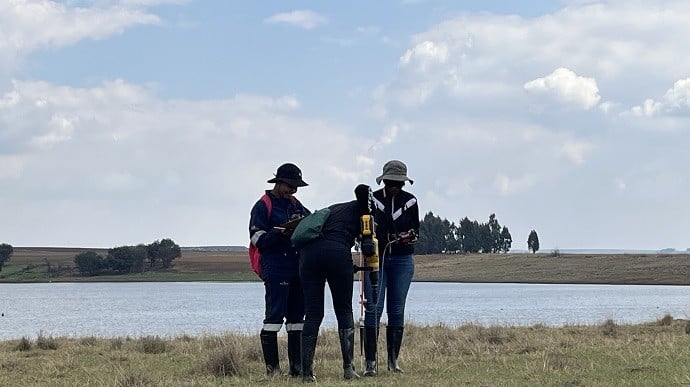
Professor Adam Bumby completed his undergraduate and honours degrees at the University of St Andrews in Scotland. His MSc and PhD were completed at the University of Pretoria (UP). He has been at the University for almost 28 years – as a member of staff for the past 20 years – and have been in involved in continuous research throughout that time.
His research, he says, is multidisciplinary. “We are dealing with early-stage identification of the presence and source of hydrogen.”
Prof Bumby adds that the research team at UP is leading local investigations that are part of an international consortium of European Union and African Union countries.
“Other parts of this research involving UP staff are considering the social, economic and political aspects within the country implicated by the presence of hydrogen.”
The geology aspect of the research falls within Faculty of Natural and Agricultural Sciences. The more social, economic and political aspects are being handled by Emeritus Professor David Walwyn of the Graduate School of Technology Management in the Faculty of Engineering, the Built Environment and Information Technology.
The project began in September 2022 and is a milestone in the research agenda of those involved.
“We began collecting field data in Mpumalanga in June 2023,” Prof Bumby explains. “A notable highlight was finding an area near Hendrina where we recorded natural hydrogen in the soil beyond the detection limits of our hydrogen meter (10 000 ppm). The ‘normal’ background reading of hydrogen in soils and the atmosphere is 0.5 ppm. Clearly, this implies a significant increase in hydrogen from the rocks below that area.”
The research consortium was the brainchild of Prof Julio Carneiro of the University of Evora in Portugal who also leads the research. He has been instrumental in establishing UP’s interest in this topic. Prof Carneiro has an extensive background in hydrogeology, carbon sequestration and geo-energy.
While Prof Bumby admires Prof Carneiro’s inspired idea in putting together the hydrogen research project, his academic role model is his MSc and PhD supervisor – Emeritus Professor Patrick Eriksson who had a long career at UP and excelled in teaching and research.
“He had an amazing ability to pull information from a wide range of sources to form cohesive, holistic theories of how the early Earth might have developed,” Prof Bumby says.
Considering the scale of this project, his hope is to identify areas where significant amounts of hydrogen are being stored below the surface in rocks.
“Going forward, it would be great if these reserves could be exploited by drilling shallow boreholes and low-cost mini power stations installed to burn the hydrogen,” Prof Bumby says.
This research matters because if sufficient hydrogen stored in layers of strata can be found and exploited, this could contribute to national energy reserves, at least within a local/small-scale setting.
“Natural hydrogen is considered to be renewable in that it is constantly produced in certain geological environments below Earth’s surface, and produces few pollutants when it burns,” he explains. “If natural hydrogen reaches the surface in sufficient concentrations, it can be collected; it burns explosively, so it can be used to power generators or used in hydrogen fuel cells. The only emission from fuel cells is water vapour. Therefore, it has the potential to be a source of cheap, non-polluting energy for small-scale electricity production and so contribute to the betterment of the world.”
His advice to school learners or undergraduates who are interested in his field is that geology is not just about rocks – it is about energy, the environment and solving some of the world’s pressing problems, including energy and pollution.
As for his hobbies, Prof Bumby says he enjoys spending time mountaineering, and restoring vintage cars and motorbikes. “Though,” he adds “I now have a young family, and that takes up all of my spare time!”
 Story
Story
Scientists at the University of Pretoria (UP) are leading a study of natural hydrogen gas discovered under the Earth’s surface in Mpumalanga – a source of renewable energy that could contribute to the national energy budget and help address the energy shortage in South Africa.
 Infographic
Infographic
Hydrogen is considered a fuel of the future due to it emitting zero emissions. This infographic explains the impact of this discovery as well as some interesting facts about hydrogen and the different forms of it.
 Gallery
Gallery
Take a journey through some pictures from the field when UP scientists explored what lay beneath Mpumalanga's soil and rocks.
Copyright © University of Pretoria 2025. All rights reserved.
Get Social With Us
Download the UP Mobile App